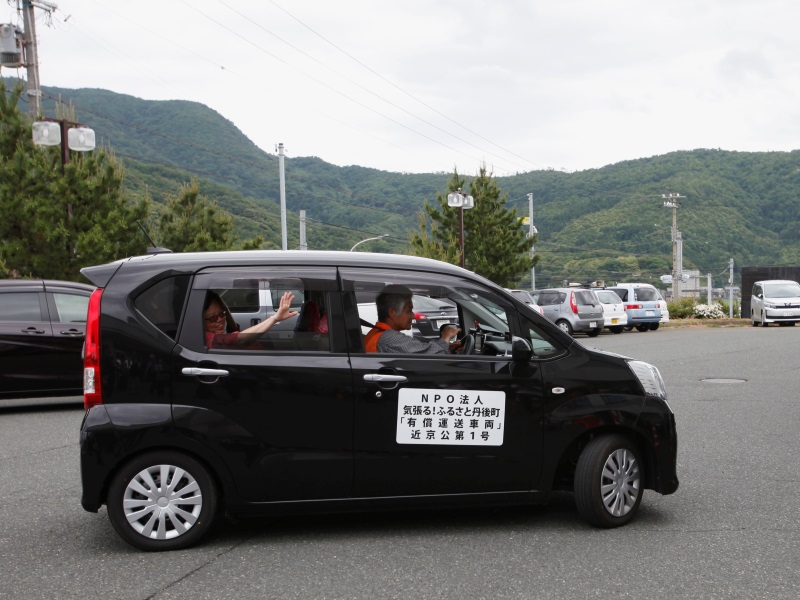Ride-hailing app Uber has finally cracked Japan - approved to offer its
service in Tango, part of Kyotango city on the west coast, with a
population of just 5,560 and abandoned by the local taxi firm eight
years ago.
Tango is one of Japan's almost 800 designated depopulated
communities, and about 40 percent of the population is aged over 65,
well above the national average ratio of 27.1 percent.
For public
transport, residents have to rely on an on-demand bus operated by a
non-profit group, but bookings have to be made by the evening before
travel and the bus doesn't go beyond the town.
Uber, valued at over $60 billion, hopes to tap that demographic demand to ferry around the elderly.
"Finally,
we were able to make our very first step," said Masami Takahashi,
president of Uber Japan Co. "This service can be a solution for Japan's
ageing society."
The US firm, one of the pioneers in the
"sharing economy", has faced resistance and restrictions in some cities
as established taxi operators complained of unfair competition.
In
Japan, Uber was blocked by authorities from setting up in two cities as
Japan bars non-professional drivers from offering taxi services. In
Tokyo, Uber operates as a travel agent, connecting users to established
taxi company drivers through its ride-hailing app.
Non-professional
drivers can only operate where public transport is not readily
available - like in Tango, where rice paddies surround a main street
dotted with old, wooden houses.
Tablets, trekking
Among the challenges Uber faces in Tango are persuading seniors to use mobile devices and credit cards.
Residents
will use tablets, such as iPads, to book Uber rides. Uber is making
available 50 tablets - easier for the elderly to read than smartphones -
for free for six months to book one of 18 registered cars.
"What a
great service," said 84-year-old Miyoshi Azuma, brandishing one of the
tablets. "With this, we can call the car by just clicking the button."
She did add that locals may need simpler instructions on how to use the
tablet and Uber app.
"I think it will take time to judge whether
this service will be a success because people here are sensitive to
money," said Takashi Ose, a 79-year-old head of a senior people's club.
Uber charges half the rate of the taxi firm in central Kyotango city.
Takuo Nakanishi, 66, who drives for Kyotango's sole taxi operator Mineyama Taxi, worries that Uber may hurt his business.
"I
can't afford to live on just my taxi salary. I can be a driver only
because I receive a pension. That's how small demand is here for taxis,"
he said, adding it is not viable for his company to offer a full taxi
service for Tango.
Uber hopes to roll out similar services in
other depopulated areas in Japan. It's global UberASSIST platform
already caters for seniors and people with disabilities, and it provides
transport services for elderly care homes in Florida, for example.
"There
are many communities which cannot respond to people's need to go
somewhere when they need," said Takahashi. "Uber can be a sustainable
business model in such places because we can provide services using
existing assets."
One of those assets, 68-year-old Uber driver Yoshihiro Hatanaka, welcomed the flexibility of Uber's service.
"I love trekking, so I'll probably only drive when it's raining," he said.
© Thomson Reuters 2016
 WhatsApp for Android Said to Be Working on Suggested Conversation Topics for Meta AI4 April 2025
WhatsApp for Android Said to Be Working on Suggested Conversation Topics for Meta AI4 April 2025 Amazon Testing ‘Buy for Me’ Agentic Feature to Let Users Purchase Products From Other Websites4 April 2025
Amazon Testing ‘Buy for Me’ Agentic Feature to Let Users Purchase Products From Other Websites4 April 2025 Apple Updates Keynote and Other iWork Apps to Support Apple Intelligence Features4 April 2025
Apple Updates Keynote and Other iWork Apps to Support Apple Intelligence Features4 April 2025 iOS 18.4 Update Brings AI Review Summaries in App Store, Lets Users Pause Downloads3 April 2025
iOS 18.4 Update Brings AI Review Summaries in App Store, Lets Users Pause Downloads3 April 2025 Apple Planning to Upgrade Its Health App, Add an AI-Powered Doctor for Recommendations: Mark Gurman1 April 2025
Apple Planning to Upgrade Its Health App, Add an AI-Powered Doctor for Recommendations: Mark Gurman1 April 2025
![Gadgets 360 With Technical Guruji: Ask TG [April 5, 2025]](https://c.ndtvimg.com/2025-04/8pgjm1vc_ask-tg_160x120_05_April_25.jpg?downsize=180:*)
![Gadgets 360 With Technical Guruji: News of the Week [April 5, 2025]](https://c.ndtvimg.com/2025-04/pt0ck3cc_news-of-the-week_160x120_05_April_25.jpg?downsize=180:*)













